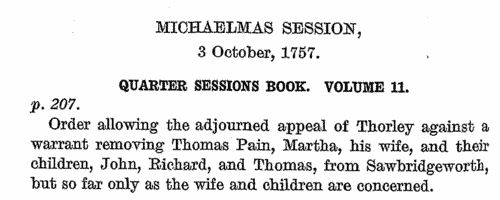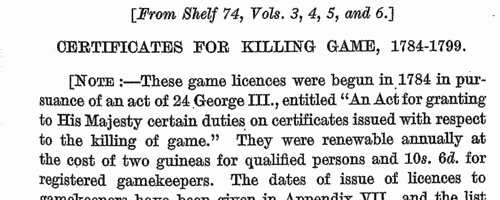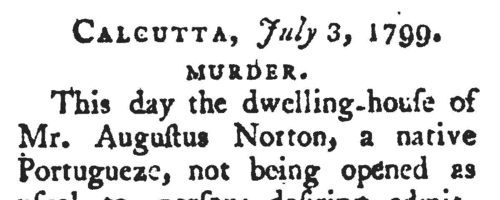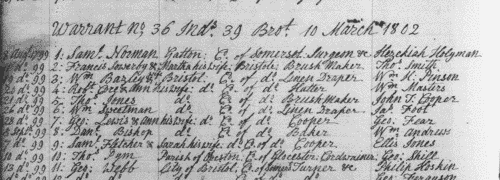Add this eBook to your basket to receive access to all 551 records. Our indexes include entries for the spelling floyd. In the period you have requested, we have the following 551 records (displaying 201 to 210): These sample scans are from the original record. You will get scans of the full pages or articles where the surname you searched for has been found. Your web browser may prevent the sample windows from opening; in this case please change your browser settings to allow pop-up windows from this site.  Masters of Apprentices registered in Cornwall
(1797) Masters of Apprentices registered in Cornwall
(1797)
Apprenticeship indentures and clerks' articles were subject to a 6d or 12d per pound stamp duty: the registers of the payments usually give the master's trade, address, and occupation, and the apprentice's name, as well as details of the date and length of the apprenticeship. There are central registers for collections of the stamp duty in London, as well as returns from collectors in the provinces. These collectors generally received duty just from their own county, but sometimes from further afield. The indentures themselves can date from a year or two earlier than this return. (The sample entry shown on this scan is taken from a Bristol return. Each entry has two scans, the other being the facing page with the details of the indenture, length of service, and payment of duty.) IR 1/68 | Sample scan, click to enlarge

| Hertfordshire Sessions
(1752-1799)
Incidents from the Hertfordshire Sessions Books and Minute Books. These cover a wide range of criminal and civil business for the county: numerically, the most cases (362) concerned assaults and rioting, and larceny (378), but there is a large variety of other matter, as extensive as the jurisdiction of the courts. These highly condensed abstracts of the entries were prepared by William le Hardy, and published for the County Council in 1935. | Sample scan, click to enlarge

| Hertfordshire hunters
(1784-1799)
Highly condensed abstracts of Hertfordshire Sessions Books and Minute Books were prepared by William le Hardy, and published for the County Council in 1935. An act of the 24th year of king George III instituted licences to kill game, which cost 10s 6d for registered gamekeepers, and 2 guineas for others. Appendix VIII is a list of persons granted two-guinea licences for killing game: in each case the full name (surname first) is given; occupation; residence; and the years during which licences were purchased (e. g., 92-93 for 1791 to 1793). | Sample scan, click to enlarge

|  Apprentices and clerks
(1799) Apprentices and clerks
(1799)
Apprenticeship indentures and clerks' articles were subject to a 6d or 12d per pound stamp duty: the registers of the payments usually give the master's trade, address, and occupation, and the apprentice's name, as well as details of the date and length of the apprenticeship. 11 March to 31 December 1799. IR 1/38 | Sample scan, click to enlarge

| Freemen of Canterbury by Apprenticeship
(1392-1800)
No man or woman could trade in the city of Canterbury without having obtained 'freedom' of the city, unless they paid an annual fee to do so. Admissions of freemen were recorded on the Chamberlains' Accounts of the city, which were prepared annually from Lady Day (25 March) to Lady Day until 1752, and thereafter each set runs from 1 January to 31 December. The accounts for 1392 are incomplete, but thereafter until 1800 there is a complete series except for the years 1455 to 1457 and the year 1552-3. Joseph Meadows Cowper, Honorary Librarian to the Corporation, produced this extract of the names from 1392 to 1800, and the volume was privately printed in 1903. There are five groups of freemen: those who obtained freedom after serving out an apprenticeship to a freeman; the children of freemen; those who married a freeman's daughter; those who claimed freedom by 'redemption', i. e. by purchase; and those who were honoured by a gift of the freedom from the Mayor and Court of Aldermen. Cowper published his lists divided into the five categories: the sample scan is from the list of those who obtained freedom by marriage. This is the index to those who gained their freedom by apprenticeship. | Sample scan, click to enlarge

| Freemen of Canterbury by Birth
(1392-1800)
No man or woman could trade in the city of Canterbury without having obtained 'freedom' of the city, unless they paid an annual fee to do so. Admissions of freemen were recorded on the Chamberlains' Accounts of the city, which were prepared annually from Lady Day (25 March) to Lady Day until 1752, and thereafter each set runs from 1 January to 31 December. The accounts for 1392 are incomplete, but thereafter until 1800 there is a complete series except for the years 1455 to 1457 and the year 1552-3. Joseph Meadows Cowper, Honorary Librarian to the Corporation, produced this extract of the names from 1392 to 1800, and the volume was privately printed in 1903. There are five groups of freemen: those who obtained freedom after serving out an apprenticeship to a freeman; the children of freemen; those who married a freeman's daughter; those who claimed freedom by 'redemption', i. e. by purchase; and those who were honoured by a gift of the freedom from the Mayor and Court of Aldermen. Cowper published his lists divided into the five categories: the sample scan is from the list of those who obtained freedom by marriage. This is the index to those who gained their freedom by birth. | Sample scan, click to enlarge

| Wives and Masters of Freemen of Canterbury
(1392-1800)
No man or woman could trade in the city of Canterbury without having obtained 'freedom' of the city, unless they paid an annual fee to do so. Admissions of freemen were recorded on the Chamberlains' Accounts of the city, which were prepared annually from Lady Day (25 March) to Lady Day until 1752, and thereafter each set runs from 1 January to 31 December. The accounts for 1392 are incomplete, but thereafter until 1800 there is a complete series except for the years 1455 to 1457 and the year 1552-3. Joseph Meadows Cowper, Honorary Librarian to the Corporation, produced this extract of the names from 1392 to 1800, and the volume was privately printed in 1903. There are five groups of freemen: those who obtained freedom after serving out an apprenticeship to a freeman; the children of freemen; those who married a freeman's daughter; those who claimed freedom by 'redemption', i. e. by purchase; and those who were honoured by a gift of the freedom from the Mayor and Court of Aldermen. Cowper published his lists divided into the five categories: the sample scan is from the list of those who obtained freedom by marriage. This is the index to all the stray names in the records: the wives and father-in-laws by whom freedom was acquired; the masters of apprentices; and other persons mentioned by the way in the record. | Sample scan, click to enlarge

| British in India and Ceylon
(1800)
The Asiatic Annual Register 'or, a View of the History of Hindustan, and of the Politics, Commerce and Literature of Asia', to some extent modelled on the Annual Register itself, included an informative Chronicle section, in which are recorded births, marriages and deaths, civil and military promotions, in Bengal, Bombay and Madras presidencies and Ceylon. | Sample scan, click to enlarge

| Deaths, Marriages, News and Promotions
(1800)
Death notices and obituaries, marriage and birth notices, civil and military promotions, clerical preferments and domestic occurrences, as reported in the Gentleman's Magazine. Mostly from England and Wales, but items from Ireland, Scotland and abroad.
| Sample scan, click to enlarge

|  Apprentices registered in Norfolk
(1801) Apprentices registered in Norfolk
(1801)
Apprenticeship indentures and clerks' articles were subject to a 6d or 12d per pound stamp duty: the registers of the payments usually give the master's trade, address, and occupation, and the apprentice's name, as well as details of the date and length of the apprenticeship. There are central registers for collections of the stamp duty in London, as well as returns from collectors in the provinces. These collectors generally received duty just from their own county, but sometimes from further afield. The indentures themselves can date from a year or two earlier than this return. (The sample entry shown on this scan is taken from a Bristol return. Each entry has two scans, the other being the facing page with the details of the indenture, length of service, and payment of duty.) IR 1/70 | Sample scan, click to enlarge

|
Research your ancestry, family history, genealogy and one-name study by direct access to original records and archives indexed by surname.
|












